Peter MALONE
Saturday, 09 October 2021 12:59
Share
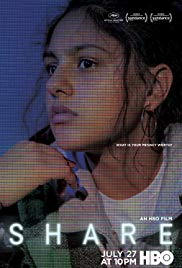
SHARE
US, 2019, 87 minutes, Colour.
Rhianne Barreto, Charlie Plummer, Poorna Jagannathan, J. C. Mac Kenzie.
Directed by Pippa Bianco.
This is a brief film made for television, for an American audience, but especially for African- American teenagers and their parents.
There is a family and school setting, a young girl eager to be with friends, videoed in the aftermath of what looks like a sexual assault and the video circulated. Her parents are very upset and want to do something about it, discussing with the school principal. The young girl accepts responsibility for what happened but does not remember it, wants a close friend to help her with the memories, confiding in a girlfriend from school.
The film is strong on its themes rather than drawing immediate conclusions – with a strong performance by Rhianne Barreto.
1. A film with social concern? Teenagers, peer groups, pressure and sexual behaviour, drinking and drugs, social media and pressures? Intervention of school authorities? Parents coping with problems?
2. The title, the young people sharing experiences, sharing videos and texts with social media? Sharing with one another? With school authorities? With parents?
3. Mandy’s story, her age, at home, family, at school, basketball, her friends in these conversations, the boys in relationships, the drinking, parties? Her ambitions? Are getting the video, the loss of memory, waking up on the lawn? The discussions with Dylan and the other boys? Her relationship with Kerry and confiding in her, Kerry’s concern about her? Her moods, the confrontation from the video and images of her behaviour, the boy’s behaviour? Not remembering? A way of coping, affirming her decision to go to the party, later going out, defying her parents, to another party? Not wanting to move away from home?
4. The girls, their talk, basketball, play? The boys, their talk, upfront, Dylan and his reticence, friendship with Mandy, wanting to help? His later recounting the story and Mandy’s reaction about his not helping her?
5. The parents, seeing the video, talking with Mandy, the attitude of each parent, confronting, supporting, anger? Going to the school authorities and the discussion? The limitations of what could be done, the interrogations, issues of police investigation, legal difficulties and resolution taking years?
6. At home, the reaction of each parent, Mandy, in her room, going out?
7. A film for television audience, a cautionary tale for parents alerting them to concern and how to deal positively with their children? A cautionary tale about social mores, 21st-century teenagers, permissiveness? The significance of the teenagers making their decisions, accepting the consequences?
Published in Movie Reviews
Published in
Movie Reviews
Saturday, 09 October 2021 12:59
Once Upon a Time... in Hollywood
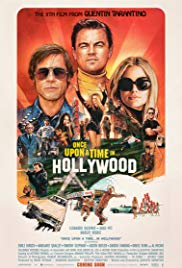
ONCE UPON A TIME IN… HOLLYWOOD
US, 161 minutes, Colour.
Leonardo di Caprio, Brad Pitt, Margot Robbie, Al Pacino, Emile Hirsch, Dakota Fanning, Bruce Dern, Kurt Russell, Zoe Bell, Mike Moh, Timothy Olyphant, Nicholas Hammond, Damon Herriman, Margaret Qualley, Damian Lewis, Julia Butters, Austin Butler, Luke Perry, Lena Dunham, Scoot Mc Nairy, Rumer Willis, Martin Kove, James Remar, Michael Madsen, Clifton Collins Jr .
Directed by Quentin Tarantino.
Inconsequentially consequential.
Quentin Tarantino loves words as well as images, often punctuating his films with rather lengthy conversations, as he sometimes does here. However, inconsequentially consequential, which came to mind while watching the film, is meant as a compliment.
Many audiences have been very pleased with this ninth film by Tarantino, taking us back half a century to the year of the moon landing but not to political and international US -though some half heard remarks about political assassinations and the Vietnam war. Rather, he journeys back to a bright sunshine Hollywood, no matter what the season, driving us around in automobiles, as passengers with Brad Pitt’s Cliftf Booth, soaking up the atmosphere of LA. And, despite the showbiz world, production and publicity and promotion, in the scheme of things it does seem rather inconsequential. In fact, some critics have been dismissive of its lightweight world.
However, there are many layers in the screenplay – many consequences. And, we have to remember the title, once upon a time, the beginning of a fairytale rather than historical narrative in La La Land.
This is immediately evident when everybody comments about the Charles Manson and Family murders, especially of the emerging star, Sharon Tate, wife of celebrated director, Roman Polanski. No spoilers, but Tarantino has found a satisfactory dramatic way of not capitalising on the murders. He acknowledges the brutality but finds an alternate way of communicating this.
For film buffs, there is the pleasure of noting the titles of Tarantino’s favourite films of that year, cinema awnings, posters, all kinds of references (and especially delighting in Sharon Tate herself going in to see screening of The Wrecking Crew are relishing the audience response). But, this is a film about television, remembering the 20 years or so since the wide introduction of television, the series, the westerns, heroic flame-throwing to destroy Nazis… And, noting how everybody goes home to watch television, the star and his stunt double, even Squeaky Fromme and members of the Family.
But the way to bring all this to life is by focusing on his central character, Rick Dalton, long time star of Bounty Hunter but, getting older, on his way out, challenged by a TV entrepreneur producer (an interesting role for Al Pacino), reminded of his fading image and career and his reliance on guest roles and commercials – but invited, as stars did in the latter 60s, to become heroes of spaghetti westerns.
Leonardo Di Caprio has shown versatility in his performances even in his teenage years. Tarantino offers him an opportunity (as he did with his villain in Django Unchained) to show this versatility, as the star, drinking, weeping at his fading status, auditioning, participating as a villain in a TV pilot Western, buddy with his stunt double, interviews, regrets, capitalising on the spaghetti experience. And a fine interlude with a little girl actress discussing books and performances. A reminder that Tarantino can do small cameo gems.
Margot Robbie brings many nuances to her performance as Sharon Tate. And, there is an extraordinary list of top actors in smaller roles including Kurt Russell, Bruce Dern, Dakota Fanning as Squeaky Fromme – and some Australians, besides Margot Robbie, including, Nicholas Hammond as director, Sam Wanamaker, and Damon Herriman, just one sinister sequence, a smiling Charles Manson.
Brad Pitt’s Cliff Booth does not have the character range as that of Rick Dalton but, ambiguous because of something in his past life, happy to be an associate stunt double, doing all the odd jobs, sometimes shirt off, he is the successful macho presence in the film.
This film is more of her general crowdpleaser than most of Tarantino’s other films – and will probably be talked about for a long time, checking out its multi-levels.
1. Audience expectations of Tarantino? A Tarantino-esque film?
2. The title, the beginning of some kind of fairytale, memories of Sergio Leone and Once Upon a Time in America? History/fantasy? Tarantino and his selected cast and the impact?
3. 1969, Hollywood, audience images of Hollywood, of Los Angeles, of the movie industry? The scenes in the streets, the driving of cars, advertisements for films, awnings? Film references – Quentin Tarantino’s favourites? The emphasis on television, pro-television, the critique of television? From the 1940s, the range of series, the audiences and everybody watching television, Rick and Cliff, the Manson family? The talk about television, series, westerns, action, heroes? And the flamethrower in Nazi Germany?
4. Audiences knowing about the Manson killings, the fate of Sharon Tate and her friends? Her pregnancy? This pervading the whole film? Simply a glimpse of Manson and his smile and wave? Cliff and his visit to the family, the girl picking him up, the attraction, his giving her a lift, the visit to the commune, ugly and squalid, the women, the fewer men, the guests writing the trail, difficulties, texts? Cliff and his wanting to visit George, George blind, Squeaky and her animosity, the letting down of the tyre, clips violence and forcing the mending?
5. The audience seeing Sharon Tate and Roman Polanski, in the car, going into their home? Sharon Tate, the starlet, her exuberance, going to the clubs with Polanski? The Wrecking Crew, the awning, her going to the cinema, chirpy, talking to the ticket seller, the manager, going to watch the film, relaxed in the cinema, delighted with the reactions of the audience? The background of her relationship with JE Sebring, working with Polanski, marrying him, the Polish friends, Sebring in the household?
6. Tarantino’s perspective on Hollywood, 1969, the blending of fact and fiction? Something of an alternate world? The device of not dramatising the death of Sharon Tate and the others but rather the fictional episode at Rick Dalton’s house, which respects the privacy of Sharon Tate’s family and friends but communicates the horror of the attack?
7. Los Angeles and its streets, the mansions, the neighbourhoods, the range of characters, costumes and decor of the 1960s, hairstyles, hippy overtones?
8. The musical score, the range of songs, the popularity of the hits of 1969?
9. The US in 1969, the Nixon era, the background of political assassinations, especially in 1967? The Vietnam war? The icons?
10. The preface to the film, the celebrity interviews with Rick and Cliff? The introduction to them both, the presence of Leonardo DiCaprio? and Brad Pitt? Rick Dalton, his age, his career on television, the western, his limitations, the glimpse of the Nazi war film and the flame throwing? His encounter with Schwartz, the discussion about his career, fading, perceptions by audiences with his screen presences, his going into specials like the FBI? His concern about his future? His drinking, weeping, his lavish home, in the pool? Working with Cliff for so many years, the stuntman, Cliff and his career? His friends? Something of the echoes of the master-slave relationship? But Cliff at home in his house?
11. Rick, offers, television, the pilot, the encounter with Dir, Sam Wanamaker, his being the villain? Going to make up, the hair and the sash, on the set? The impact of the scene between Rick and Trudy, her age, reading, the conversation, her interest in his work, affirmation? The encounter with James Stacy, star of the show, their scenes together? Wanting a job for Cliff, Randy and his denunciation of Cliff, for murdering his wife, Janet and her hostility – yet Cliff allowed on the set?
12. Cliff, his life, satisfied with it, the stunts, the risks, the odd jobs, fixing the antenna and Brad Pitt taking off his shirt? His dog, the bond, the food and preparing the cans, the Brad Pitt image?
13. Cliff, his seeing Pussycat in the streets, her wanting a lift, finally giving her a lift? Going out to the commune, his reaction to the members, hippies, grubby, the derelict look of the commune, the range of women and their ages, the fewer men? Texts and his taking the couple on the writing tool? Cliff wanting to see George, the past friendship, the encounter with Squeaky Ron, her watching television, protecting George? Going to see George, his loss of memory, his being blind, yet dependent on Squeaky, a television with her? The ominous atmosphere of the commune? The car tire, Cliff and his violence getting the man to repair it? The sequences preparing the audience to understand Manson and the Family? The irony of showing only one sequence with Charles Manson himself, looking up at Rick and the genial smile?
14. Cliff and Jackie Chan, Jackie Chan’s role, his self-importance, the challenge, cliff beating him? Jackie Chan and his martial arts roles in films and technical advice?
15. Rick, meeting Marvin Schwartz again, the possibilities of spaghetti westerns and Rick not liking them? His going to Italy, making the film is, success, the James Bond parallel, his meeting his wife, bringing her home, prepared to let Cliff go, but Cliff at home? The presence of the dog?
16. Texan the girls, on the prowl, mistaking the Polanski house, the attack on Cliff, cliff setting the dog on them, the brutal treatment? Discovering Rick in the pool, his going down to the car, warning them off the grounds? The return, injuring Cliff? Rick and the flamethrower? The aftermath, cliff going to hospital, Rick going to see him the next day, but accepting the invitation from Sharon Tate to go up to the mansion – and the implications of the massacre?
17. The range of themes, the range of talented actors in small cameo roles? Tarantino and his perspective on the period, television in the series, audience watching television, the glitter of Hollywood, the fantasy world, comparison with American realism? 50 years later, the critique, images, celebrities, match our images? In the 1960s and the transition to the 1970s?
Published in Movie Reviews
Published in
Movie Reviews
Saturday, 09 October 2021 12:59
Dear Dad
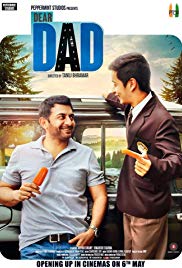
DEAR DAD
India, 2016, 95 minutes, Colour.
Arvind Swamy, Ekavali Khanna, Himanshu Sharma, Aman Uppal.
Directed by Tanuj Bhramar.
Dear Dad is one of a number of Indian films on the theme of sexual orientation. This time it is the father of a family, facing up to his orientation with his wife, going on a trip to explain his situation to his teenage son, calling in to visit his parents, his father having suffered a stroke, sitting still and speechless. This is very much the Dear Dad of the title – although, of course, it relates to the response of his son.
As with many Indian films, there is a great emphasis on scenery, travelling through the Indian countryside, mountains, landslides, hotels on the way to the destination, an impressive building for the private school.
The audience may be just as surprised at the revelation about the orientation of the father as the characters in the film. The son is rather preoccupied with his friends, not wanting to have a talk with his father, seeing a TV celebrity on one of the stops and inviting him to come along which his father resists – although they meet later in the journey, do give him a lift, and he becomes crucial as someone who can listen sympathetically to the father and encourage the son.
The audience is invited to be empathetic to the father, acknowledging the secrecy of the past, the burden of coming out, the breaking of a marriage, issues of how to communicate with the son – and the son accepting his father’s situation but focused very much on the breakup of the family and wishing that this would not happen.
While the film is interesting in terms of the Indian situation, laws against homosexuality, its quieter dealing with the issues make it more accessible to a wider audiences internationally
.
1. Indian story? Family? The 21st-century, traditions? Issues of sexuality and orientations?
2. The title, the focus on Nitin, age, marriage, the two children, genial with his children? His plan to tell his son about his orientation? His visit to his parents – and his coming out to his father? His son overhearing, reaction?
3. The Indian setting is, the affluent homes, roads and highways, contemporary India, the beauty of the countryside and mountains, the town, the hotel, the vast school and offices?
4. The issue of sexual orientation in India, in society, status in law about homosexuality?
5. Sympathetic portrait, father and son relationships, a way of dramatising the issues for the Indian audience? The impact for non-Indian audiences?
6. Nitin, his relationship with his wife, her urging him to tell their son, the little girl and her being playful, the lipstick, wilful, upset about school? Shivam, his age, wanting to be with his friends, not wanting to drive with his father? Stopping at the cafe, Shivam seeing the celebrity, getting his autograph, wanting to give him a lift but his father refusing, his sulking?
7. Stopping to see the grandmother, the grandfather and his sitting, mute, unshaven? Nitin talking to him, memories of the past, his outing himself? Shivam hearing, the angry reaction? Not so much concerned about his father but himself and changes in the family?
8. The drive, the silence, picking up the celebrity, his cheerfulness? The landslide, the roads blocked, staying at the hotel, meeting up with the friends, their staying in the room, the celebrity staying with Nitin? Nitin confiding in him, his reaction, sympathetic?
9. Shivam, with the boys, looking at the sex magazines, confiding in his friend? Homosexuality as an illness, online advice, going to the receptionist, being taken to the mystic, the discussions about homosexuality, the condemnation, the medicine to cure? Their putting it in Nitin’s drink, his being ill, the celebrity looking after him? The phone calls, Shivam phoning and telling his mother, her concern and phone call?
10. Father and son talks, trying to understand? The celebrity thinking about the story and going to visit his father after 15 years? Shivam and his going back to school?
11. Months later, Shivam and his success with his mathematics, the award, his family present, his wife and the new partner? Nitin at the back, the shouted congratulations? The discussions with the school principal? The father, telling his wife’s new partner that Shivam did not want to go out with him? Their going out on the town – Shivam talking about Nathalie, his father getting the ladder, climbing up the ladder, talking to Natalie, Shivam giving her the portrait?
12. The aftermath, the principal, her severity, shock at the situation?
13. A sympathetic portrait of a man troubled by his orientation when young, marrying his best friend but not loving her with sexual intimacy, the decision to reveal the truth, the consequences, his telling his story and audiences appreciating and understanding?
Published in Movie Reviews
Published in
Movie Reviews
Saturday, 09 October 2021 12:59
England is Mine

ENGLAND IS MINE
UK, 2017, 95 minutes, Colour.
Jack Lowden, Jodie Comer, Jessica Brown Findlay, Laurie Kynaston, Simone Kirby, Peter Mc Donald.
Directed by Mark Gill.
When audiences learn that this film is about the early life of singer and musician, Steven Patrick Morrisey, the foundation member of The Smiths, they will probably expect a great deal of music. This is not the case. This is the story of Morrisey before he became famous and part of The Smiths. While that may be a disappointment for fans, it does provide an opportunity for a portrait of Morrisey, his Manchester background in the 1970s and 1980s, his relationship with his family, his father walking out, support from his mother, interactions with his sister.
But, what is of interest, is the personality of Morrisey, ambitious, mostly self-absorbed, creative writing, interest in music, having to work in a tax office but frequently being absent, introspective and sometimes shy while ultimately relishing performance. He has several women friends along the way, a fellow student who gives up on him initially, another friend who is an artist, a friend who works in the tax office.
So, this is a portrait of an artist as a young man, not a particularly engaging young man, but someone who was to emerge significantly in the British music world. His played particularly well by an initially unrecognisable Jack Lowden, who is building up a sound body of performance with War and Peace, Mary Queen of Scots, Fighting with the family…
1. Audience knowledge of Steven Patrick Morrissey? Of the career of The Smiths? Their impact?
2. The title, as perceived by Morrisey, in the 1970s and 80s? His ambitions?
3. A story about Morrisey before he became a celebrity? Audiences interest in him, his life and personality, his struggles? The film not featuring The Smiths?
4. The Manchester setting, the 1970s and 80s, other films about music and bands in this era and this area?
5. Jack Lowden’s performance as Morrisey? Young, teenage, young adult? His appearance, long hair, later short hair? Young and getting older? His place in the family, tension with his father, his father’s leaving, the effect on his mother, her support of him? His interactions with his sister, critical of her lack of ambition, making comparisons?
6. Morrisey, rather introverted, with the symptoms of depression? His writing, at the typewriter, in his room? Poetic, lyrics? Publication? His not being satisfied? The discussions with his friend from school, the possibility of an interview for music and the band, his unwillingness to meet the contact? His friend’s leaving him?
7. His going to work, the tax office, absent and absent open-minded? His boss and the demands? The others in the office? His not wanting to work there?
8. Music, bands, the music of the period, his involvement? The gig, the experience, the exhilaration? A one-off?
9. His friendship with Linder, her art, urging him on, taking him out, the exhibition, going to London? The bond between them?
10. Christine, at work, the bond, going out with her, meeting Linder? Support?
11. Time passing, his expression about himself, grandiose ideas, ambitions?
12. The members of the band, discussions, the visit and the playing of the records, the possibility of belonging to the band – and the phone call, the producers not wanting him?
The contact with Johnny – and the opening up to the future?
Published in Movie Reviews
Published in
Movie Reviews
Saturday, 09 October 2021 12:59
Only Mine

ONLY MINE
US, 2019, 87 minutes, Colour.
Amber Midthunder, Brett Zimmerman, Chris Browning, Walter Fauntleroy, Claudia Ferri.
Directed by Michael Civille.
If you would like to see a film about obsession and stalking leading to violence, this might fit the bill. It is the story of a young woman in a small town who wants to leave to pursue studies, encountering a sympathetic police officer, beginning a relationship with him only to discover that he is extraordinarily obsessive, violent. He is misogynist in his dealings with the young woman.
The film opens with an impression that she has been severely injured, possibly killed. There are flashbacks building up the development of the relationship and its collapse. The technique is used of interviews with friends and investigating police officials.
The title expresses the obsessive view of the police officer.
1. The title, expectations, relationships, possessiveness, obsession?
2. The setting for the melodrama, the country town and its look, homes and streets, the police precincts? Outside the town, the countryside, the woods and the beauty? The musical score?
3. Julie’s story? Her background, ambitions, to leave, to study? The encounter with David, romantic, the bond with him? David and his story, in the police, the return, his status in the town, his work? Bonding with Julie?
4. The structure of the film, the injuries to Julie, whether dead or alive, what happened to her?
5. The style of the narrative, the range of interviews with Julie’s family, friends, the police…? The audience learning more about her, the criticisms and bad-mouthing of her, the dangers?
6. The relationship between Julie and David, from love, to obsession, to cruelty, to rejection, to vicious revenge, to violence?
7. The consequences for Julie, the rumours and criticisms, her coping, support from her friends, family?
8. People believing David, his authority, charm? The revelation of the truth about him – and its revelation to the audience?
9. The combination, the violence, – and Julie surviving?
Published in Movie Reviews
Published in
Movie Reviews
Saturday, 09 October 2021 12:59
Small Town Crime
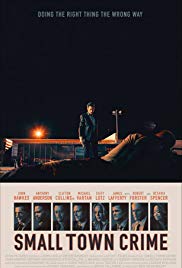
SMALL TOWN CRIME
US, 2017, 91 minutes, Colour.
John Hawkes, Anthony Anderson, Octavia Spencer, Robert Forster, Clifton Collins Jr, Michael Vartan, Daniel Sunjata, Dale Dickey.
Directed by Eshom Nelms, Ian Nelms.
With the title indicating that this is a film about a small town, it is also a murder investigation, focusing on a police officer who drinks, has been suspended, wants to be officially reinstated. His played by John Hawkes, an excellent character actor who made a not dissimilar thriller at this time, Too Late.
This film boasts a substantial cast with Anthony Anderson taking on a serious role as the policeman’s brother-in-law, with, perhaps surprisingly, Octavia Spencer as his half sister. Michael Vartan and Daniel Sunjata are police officers, generally a step behind the central character. And there are complications with the character actors Robert Forster and Clifton Collins Jr.
The film was made by brothers and some commentators indicate nods to the films of the Coen Brothers.
1. The title? The small town itself, situations, characters, echoes of a Western story?
2. The town, ordinary, homes, bars, drinking, the police precincts, the prostitute areas, wealthy homes? The musical score?
3. Mike Kendall, John Hawkes’ screen presence and performance, edge? Age, life, in the police, the brutal death of his partner, suspension, his drinking, plea to return to work? A moral collapse?
4. His friendship with Teddy, half brother to Teddy’s wife? Their bonding, drinking together, Teddy and his help, the crises, the intervention of his wife, her common sense? The racial themes? The story, comic, serious?
5. The drinking, Mike out in the fields, the discovery of the woman, taking her to hospital, her death? His taking the opportunity to ingratiate himself? The investigation? Police refusal, the two detectives, their personalities, following in his footsteps?
6. Mike and the ups and downs of his life?
7. Mood, Mexican can background, his patter, the range of prostitutes, young, defiant, his control, aiding in the investigation?
8. The murdered girl’s grandfather, the interviews, his interventions, his skill with the gun?
9. The killers, ruthless, building up to the confrontation?
10. The solutions, the crises, Mike handling them? His future?
Published in Movie Reviews
Published in
Movie Reviews
Saturday, 09 October 2021 12:59
Otherhood
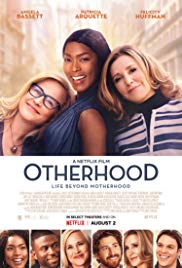
OTHERHOOD
US, 2019, 100 minutes, Colour.
Angela Bassett, Patricia Arquette, Felicity Huffman, Jake Hoffman, Jake Lacey, Sinqua Walls, Heidi Gardner, Damien Young, Frank de Julio.
Directed by Cindy Chupack.
The title does come up as Motherhood but the M falls off leaving the present title, the trials of motherhood for middle-aged mothers who have let their sons go out into the world but who do expect contact, some affection, especially on Mother’s Day – and, when it doesn’t come, they have a meeting and decide to driver drive down from Connecticut to New York to check on their sons.
The film is directed by Cindy Chupac who was responsible for, amongst other things, Sex and the City, this film giving the opportunity to its stars to let their hair down somewhat as they visit New York.
It is quite a range of actresses who portray the mothers, Angela Bassett living by herself, love of flowers, regretting her son who edits a men’s magazine, not sending flowers for Mothers’ Day. Patricia Arquette is a rather clinging mother, her son preferring to be far away from her. Felicity Huffman has had several husbands. Her son has come out, she is rather a prima donna in her dealings with her friends as well is as with her son and his friends, especially when she discovers that he is come out to his father before her.
The film is episodic, Angela Bassett staying with her son and catching him in compromising situations but, eventually going out on the town, dancing, something which she loves, drinking and letting her hair down. Patricia Arquette, stays with her son who is willing her to leave, is promoting a girl whom he might marry, has been critical of the girl he does want to marry. And, as mentioned, Felicity Huffman has all the melodramatics.
Interesting to see the actresses in middle age with these performances and observing how the sons behave in their own lives, towards their mothers, and possibilities of reconciliation and more mature relationships between mothers and sons.
1. The title? Motherhood and the dropping of the M
2. An American light comedy – with serious undertones? Some raucous humour? Some sentiment?
3. A film for women, women over 50, the experience of motherhood, children going out into the world, distance? Reconsidering their lives and the relationship with their children? Wanting to do something about it? Assert themselves, re-connect? Learn of their mistakes and admit them?
4. The introduction to the three mothers and the themes, the backgrounds, bringing up their children, the friendships over the years, the relationship with husbands (and the later revelation of infidelity)? Mother’s Day, no phone calls or flowers? Carol alone sending herself flowers? The meeting, regrets, the decision to go to New York City? The musical score and songs – these boots are made for walking?
5. The introduction to the three sons, Matthew, magazine executive, sexual title, for young men, and ogling women? His own relationships? Daniel, wanting to write a novel, lonely, depressed, the proposal to Erin and her relationship with her coach? Paul, gay, his relationship with Frank, friends, his job? Coming out to his father, not to his mother?
6. The three women, the arrival, Carol moving in with her son, his shock? His explanations about lack of contact with his mother? Staying, cooking, concerned? Helen, unable to go to her sons, in the hotel? Meeting up, the issue is not coming out to her but to his father? His accusations of her self-centredness? Her next marriage? Julian, talking with her son, his being morose, not wanting her there, telling her to shut the door when she left?
7. The effect on each of the women, Carol and her makeover, her hair, liking to dance, dressing up, and to the party, drinking, meeting Juliet? The consequences? Finding her son and the underage girl? Reprimanding him? Helen, her melodramatics, the discovery of the sperm donation, Paul’s distancing her from the child? His explanations? The fact that the child was born, her going on the shopping spree, meeting Andrea in the park, bonding? Julian, telling the story about her husband’s infidelity, Daniel and his reaction, his mother setting him up with the girl and the conversation in the restaurant, the issue of the ring, Aaron and her doing the hairstyling, her going to California, his mother urging Daniel to pursue Erin, chasing the van, driving it to California? New Year
8. a year later, Erin pregnant, the wedding? Helen and the argument with her two friends, their denunciations? The wedding and the reconciliation? Mat and Juliet arriving with Carol coming home from Italy and her artwork there?
9. The touch of the American raucous, the director and her work on Sex and the city, truth is told, bonds reconciled, sentiment?
Published in Movie Reviews
Published in
Movie Reviews
Saturday, 09 October 2021 12:59
Kidnapping Stella
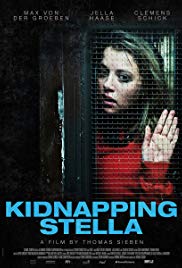
KIDNAPPING STELLA
Germany, 2019, 89 minutes, Colour.
Max von der Groeben, Clemens Schick, Jella Haase.
Directed by Thomas Sieben.
An abduction thriller, The Disappearance of Alice Creed, 2009, was well reviewed in England. Its theme was taken up in the 2013 Dutch version of the original. And, here it is again, in a German version. Some have complained of the lack of acknowledgement of the later versions to the original but the remakes do, in fact, credit the writer of the original film J Blakeson.
The focus is on two men out of prison planning to abduct a young woman and hold her to ransom. They do all this although her father is initially unwilling to pay up. There are various complications, especially with the fact that one of the abductors knows and has suggested this young woman, she claiming that she is pregnant by him. He, of course, has to keep this information and contact from his co-conspirator.
As with so many of these dramas, felons fall out, and the victims are sometimes able to turn the tables on their abductors.
In many ways, this is a standard version of an abduction and ransom story.
1. The German version of the British Disappearance of Alice Creed and its Dutch remake?
2. The German setting, the city, the streets and the abduction, the rooms for the hostage, the derelict wharf, the countryside? The musical score?
3. The plan, Vic and Tom, time in jail, concocting the plan? Their backgrounds, criminal, getting out, the abduction, the choice of the victim, Tom and his suggestion, the revelation of his knowing Stella, boyfriend, her pregnancy? Her rich father, demanding the ransom?
4. The plan going well, the preparation of the room, stalking Stella, the masks, the van, taking her, her screaming, the cuffs, the mouthguard?
5. Her reaction, anger, confronting Tom, the story, the pregnancy, Tom checking the documents in the car? Her anger at him and his giving up, in prison? Not knowing anything about Vic? Feeding her, the embarrassment with the toilet?
6. Vic, character, intense, dominating Tom, wanting honesty, discovering the bullet, questioning Stella, her finally admitting the truth? Vic and the confrontation with Tom? Tom, the plan, his being nervous, Vic forcing him to eat, the clash with Stella, the effect on him? Vic getting the truth out of him?
7. Contact with the father, his initial refusal, subsequent agreement? Taking Stella to the wharf? Going out into the countryside, Tom digging, the money not there, Vic and the confrontation, the gun, Tom being shot?
8. Vic, the return to Stella, planning to kill her, the injection, Tom’s arrival, the confrontation, Stella tripping Vic, Tom shooting him? Tom and his dying?
9. Stella, the experience, in the car, the money, going home?
Published in Movie Reviews
Published in
Movie Reviews
Saturday, 09 October 2021 12:59
Zinzana: Rattle the Cage
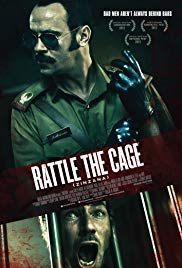
ZINZANA: RATTLE THE CAGE
United Arab Emirates/Jordan, 2015, 97 minutes, Colour.
Saleh Bakri, Ali Suliman, Omar Abdulhamid, Ahd, Mansoor Alfeeli,
Directed by Majid Al Ansari.
This is a drama thriller from the United Arab Emirates, sponsored by Abu Dabi but filmed in Jordan. In fact, locations are not important because all the action takes place in the one room in a police precinct, the open space of the office, with cells for the prisoners.
The plot is not immediately predictable. There is a prisoner in the cell, arrested for brawling, an alcoholic who was tried rehabilitation. In the adjacent cell is a man with whom he fought, who is to be released, and who is revealed as being the fiance of the alcoholic’s ex-wife. The other character at the beginning of the film is the official supervising.
There is quite a sudden turn of events when a mysterious police official arrives, eccentric in his manner, but also threatening, who kills the supervisor, torments the prisoner, forces his wife to come to the prison and menaces her, is all charm to the rather large and ambitious policewoman who arrives for the day’s work, but has a plan for promotion.
Ultimately, the plot is really straightforward because the false policeman is organising the escape from prison of his younger brother – whom he also taunts, urging him to shoot the alcoholic.
There are some variations on the theme that keep audience attention apart from a certain fascination with the two characters and their interplay. And, as always, there is also the interest of how tables might be turned which, in this case, they are.
Audiences might be reminded of Guy Pearce as they look at the alcoholic character – which does suggest that this could be quite effectively remade in the US or Britain.
1. A thriller from the United Arab Emirates? The cultural background?
2. The action all taking place in the one room, the space for the official, desk, cupboards, adjacent rooms, the cells and the bars? The musical score?
3. The credibility of the plot, the prisoners, the impersonation, the killings, the plan for release, the interactions of the characters? The twists and ingenuity of turning tables?
4. The focus on the prisoner, gradually learning of his background, his marriage, love for his wife, his drinking, the separation, attempted rehabilitation, his concern for his son? His brawling with his ex-wife’s fiance? Their being in prison? His interactions with the guard, conversations, the phone call? The night? The indication of dreams and nightmares?
5. The arrival of the officer, his style, manner, the blend of madness, showing off? His continued talk, melodrama? Killing the guard and stowing his body? The threats to the prisoner, their discussions, the taunts, the phone call, using the prisoner’s wife and her turning up? Threats? The woman arriving for her work, her IT studies, wanting to please, large, a genial manner, doing whatever was asked her, buying meals, the out of order sign for the toilet…?
6. The prisoner, seeming hopelessness, getting the cigarette from the woman, setting the clothes alight? His reaching for the phone, alerting the police, their ringing back, the failure of this plan? The arrival of the fiance, his curiosity, the prisoner trying to warn him, his being killed?
7. The arrival of his son, the bond between father and son, the official and his threat, the son in the cell? The wife arriving?
8. The purpose of the raid, the brother being released, urge to shoot, his not being able to?
9. The fulfilment of the mission, the official and his gun, the plea for the last drink, holding the alcohol, blowing it into the face of the official and the fire starting, the official shooting, wounding the prisoner? Getting the keys, collaborating with the boy, the official urging his brother to shoot, the prisoner shielding his wife and son, the brother saying that
he did not have the will to shoot, firing into his brother?
10. The tension, cat and mouse and tactics, violence and menace, survival?
Published in Movie Reviews
Published in
Movie Reviews
Saturday, 09 October 2021 12:59
In Darkness/ 2018
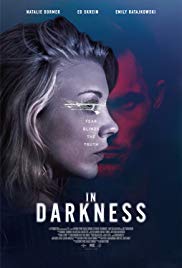
IN DARKNESS
UK, 2018, 110 minutes, Colour.
Natalie Dormer, Ed Skrein, Emily Ratajkowski, Joely Richardson, James Cosmo, Neil Maskell, Jan Bijvoet.
Directed by Anthony Byrne.
The screenplay for this thriller was written by the star, Natalie Dormer, and her partner, the Director, Anthony Byrne.
While the film is set in London at the beginning of the 21st-century, it harks back to the atrocities in the wars in the Balkans are in the 1990s. The focus is on a blind pianist, the audience sharing the experience of the pianist in the detail of her daily life. She makes a friend of a woman who believes in her block of flats – who is later killed.
The next focus is on a prominent businessman in England who has a record of brutality in the Balkans. He employs two security guards, Joely Richardson, Ed Skrein, the blind pianist is attacked but complications emerge about her past life, her mother, the businessman’s brutal treatment and the pianist working for her revenge.
Somewhat unusual vengeance story.
1. The title? Sofia’s life, blind? The darkness of the underground and worlds of vengeance?
2. The work of the writer-director in collaboration with Natalie Dormer?
3. Topical issues of the late 20th century? Serbia, the war, atrocities, vengeance? Vengeance underground, vengeance in public?
4. Sofia’s story: seen as a pianist, with the orchestra, Braille, her performance, the daily routines, travel, the underground, her apartment, walking with her cane, the audience sharing the experience of being blind? Veronique’s death, the reaction, not seeing it, not hearing because of earphones, the complexity of her attitude towards Veronique?
5. The music, scoring for the film by the orchestra, Sofia and practice, performance at the party?
6. Veronique’s father, his past in Serbia, surface respectability, charities? The demonstrations against him? His social, people at the party, Sofia playing the piano, his speaking with her, the champagne? His using Alex and Mark for security? Their loyalties, prepared to murder? Veronique and her death, her pregnancy, her father’s attitude towards her, her attitude towards him? The truth about the past, his telling his story, the threats, the cruelty, the blind mother, Sofia, the rapes? His revisiting Sofia, intent to kill her? The significant photo?
7. Alex, security, ruthless, the connection with the Serbian warlord, Sofia picked up, in the van, the breaking of her fingers? The further threats, Mark, his relationship with Veronique, discovering that Sofia was blind? Veronique’s pregnancy? The importance of the USB stick? Alex and her wanting it, the exchange? Mark wanting to save her, running, the fight and the thugs, his death?
8. The police officer, the interrogation of Sofia, his gauche manner, his family and his little daughter, the interviews, working out what it happened, trying to save Sofia?
9. The complexity of the story and its twists? Vengeance themes?
Published in Movie Reviews
Published in
Movie Reviews